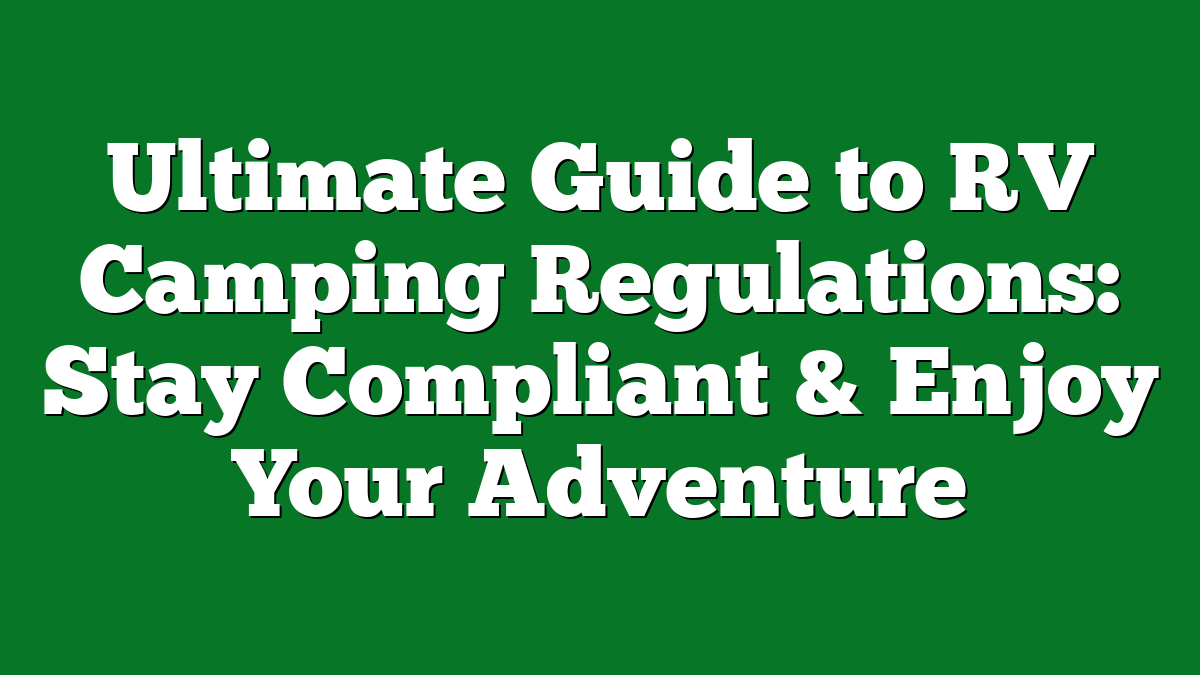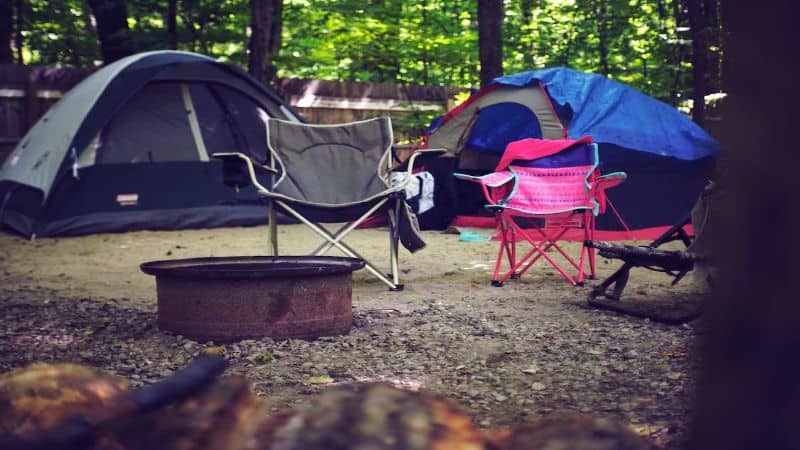Hitting the open road in an RV is one of the best ways to explore the great outdoors. There’s nothing quite like the freedom of traveling at your own pace and discovering new places. But before you pack your bags and set off, it’s crucial to understand the camping regulations that come with RV life.
Navigating these rules can feel overwhelming, especially if you’re new to the RV scene. From parking restrictions to waste disposal guidelines, knowing the ins and outs of camping regulations can make or break your adventure. Join me as I break down everything you need to know to ensure a smooth and enjoyable RV camping experience.
Overview of RV Camping Regulations
Understanding RV camping regulations enhances my outdoor experiences and helps me avoid potential issues while traveling. These rules vary by location and usually include guidelines on parking, waste disposal, and campfire usage.
Parking Regulations
Parking regulations often dictate where I can park my RV overnight. Municipalities or campgrounds typically have designated spots, and some areas prohibit overnight parking altogether. I check local ordinances before I set up camp to ensure compliance. Popular spots may fill quickly, so I arrive early to secure a good location.
Waste Disposal Guidelines
Waste disposal policies are crucial for maintaining the environment. Most campgrounds provide designated waste disposal sites for trash and recycling. Additionally, I use designated dump stations to handle my RV’s black and grey water safely. Following these guidelines helps protect pristine natural areas.
Campfire Regulations
Campfire rules can significantly impact my camping experience. Fire bans often apply during dry seasons to prevent wildfires. I always check local fire restrictions and ensure I use established fire rings when allowed. Following fire regulations not only keeps me safe but also preserves the surroundings for future visitors.
Quiet Hours and Noise Restrictions
Many campgrounds implement quiet hours to maintain a peaceful environment. These hours usually start around 10 PM and last until 7 AM. I respect these times, keeping noise levels low to ensure everyone enjoys the tranquility of nature.
Additional Regulations
Various other regulations may apply depending on the area. Some spots enforce specific occupancy limits for RVs, while others require permits for overnight stays. Researching and familiarizing myself with local rules enhances my RV camping trips.
Adhering to these regulations not only ensures compliance but also fosters a shared appreciation for the great outdoors among campers.
Understanding Local Laws
Understanding local laws is essential for a successful RV camping experience. Familiarity with these regulations prevents unwanted surprises that can disrupt a trip. Here’s a closer look at various laws that guide our adventures.
Federal Regulations
Federal regulations set the baseline for RV camping across the country. These rules often entail guidelines for activities in national parks and forests, where I frequently find myself. Campers must adhere to the Leave No Trace principles, which include not disturbing wildlife and minimizing our impact on natural resources. Fire regulations differ by region, and it’s crucial to familiarize myself with any fire bans, particularly during dry seasons. I also respect camping limits, as staying in designated areas helps preserve the surrounding environment. Ignoring these regulations can result in fines, so keeping them in mind ensures a more enjoyable trip.
State-Specific Guidelines
State-specific guidelines vary widely and deserve my attention. Each state has its own set of rules governing parking, waste disposal, and campfire restrictions. For instance, some states allow overnight parking in specific areas while others impose stricter regulations. I always check local guidelines before hitting the road to avoid unintended violations. Waste disposal methods differ, too; using established dump stations and designated trash areas is crucial. Rules surrounding noise levels and quiet hours are also common, so staying respectful of fellow campers and nature keeps everyone happy. By staying informed about state regulations, I enhance my trips and create a more respectful camping culture.
Campground Rules and Policies
Understanding campground rules and policies is vital for a smooth RV camping experience. Each campground has its own set of guidelines, so I always recommend checking their specifics before heading out.
Finding the Right Campground
Finding the right campground makes all the difference. I often browse online resources, like reviews and campground directories, to help pinpoint sites that suit my needs. Consider factors such as location, amenities, and recreational opportunities—like fishing spots or hiking trails—when choosing a campground. Checking if the campground fits your RV size and equipment also speeds up the process. Some campgrounds may require reservations, especially during peak seasons, so I always secure my spot ahead of time.
Common Campground Restrictions
Many campgrounds enforce common restrictions, which can vary widely. For instance, some places prohibit campfires altogether to prevent wildfires, while others designate specific fire rings for safe use. Noise regulations typically include quiet hours, usually from 10 PM to 7 AM, to ensure everyone enjoys nature’s serenity. I respect these rules because they help maintain the peaceful atmosphere I cherish.
Occupancy limits are also a factor to consider. Campgrounds may restrict the number of people and vehicles per site, promoting safety and comfort. Additionally, pet policies can differ, with some campgrounds allowing pets while others do not. I always read the rules carefully to avoid any surprises that can disrupt my camping experience.
Through proper research and adherence to campground rules, my RV trips become more enjoyable, allowing me to focus on the great outdoors.
Safety and Environmental Considerations
Being an avid camper, I know that safety and environmental awareness play crucial roles in enjoying the great outdoors. Understanding and following the relevant regulations not only enhances my experiences but also protects the environment for future adventurers.
Waste Disposal Regulations
Proper waste disposal is vital for maintaining the beauty of nature. I always look for designated waste disposal sites in campgrounds and public areas. Using trash bins for litter is a must, while recycling whenever possible makes a positive impact. For RV waste, I rely on proper dump stations, ensuring I dispose of black and gray water correctly. This responsibility helps keep our natural spaces clean and enjoyable for all.
Fire Safety Rules
Camping often involves building a fire, but I follow strict fire safety rules to prevent wildfires. I always check local fire regulations before starting a campfire. Using established fire rings minimizes risks, and I’m careful to keep the fire small and contained. During dry seasons or fire bans, I switch to a portable stove for cooking. Lastly, I never leave a fire unattended and make sure it’s completely extinguished before heading to bed or leaving the area. This approach fosters safety and respect for the environment while I enjoy my outdoor adventures.
Resources for RV Campers
A variety of resources can enhance the RV camping experience, making it easier to navigate rules and regulations. Here, I’ve highlighted some valuable online tools and government resources that every camper should know.
Online Tools and Apps
Apps make RV camping simpler and more enjoyable. The following tools help I stay organized and informed:
- Campendium: This app helps find campgrounds and RV parks, showing user reviews and photos. It covers amenities, pricing, and cell signal strength.
- AllTrails: For discovering hiking trails near camping spots, AllTrails offers detailed maps and trail conditions. It’s perfect for planning outdoor adventures.
- Park4Night: This app offers a community-based platform for finding overnight parking options and user-shared information on free spaces. It helps locate hidden gems off the beaten path.
- Good Sam: This resource provides discounts on RV parks and campgrounds. Membership often includes roadside assistance, ensuring a safe journey.
- Waze: For navigation, Waze offers real-time traffic updates. It helps avoid road construction and find the best routes to campgrounds.
Government Resources
Utilizing government resources ensures compliance with regulations and keeps me updated on important information. Key resources include:
- Recreation.gov: This site allows booking in national parks and forests. It also shares information on permits, campground availability, and site regulations.
- National Park Service: This resource provides guidelines about camping in national parks, including rules on fires, wildlife, and proper waste disposal.
- U.S. Forest Service: This agency lists specific rules about forest camping, including fire restrictions and safety protocols. They also provide maps and information on wilderness areas.
- State Park Websites: Each state maintains its own park websites with localized camping regulations. These allow me to check for changes in rules and available amenities.
Using these resources helps ensure a smooth camping experience while staying within regulations and protecting the natural beauty I love.
Conclusion
Navigating the world of RV camping regulations can feel overwhelming at first but it’s all part of the adventure. By understanding the rules and guidelines specific to each location I visit I can make the most of my outdoor experiences while respecting nature and fellow campers.
Staying informed not only helps avoid fines but also fosters a sense of community and responsibility. With the right resources and a little preparation I’m ready to hit the road and explore the great outdoors with confidence. Happy camping!











